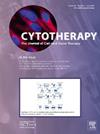从全血中高效制造CAR-T细胞:降低成本和提高癌症治疗可及性的可扩展方法。
IF 3.7
3区 医学
Q2 BIOTECHNOLOGY & APPLIED MICROBIOLOGY
引用次数: 0
摘要
背景:嵌合抗原受体T (CAR-T)细胞在白血病和淋巴瘤等癌症的治疗中取得了显著进展。传统上,T细胞是通过白细胞分离术从患者身上收集的,这是一个昂贵且有潜在侵入性的过程,需要专门的设备和训练有素的人员。尽管全血采集在技术上要简单得多,但全血起始材料尚未广泛用于临床CAR-T细胞制造,部分原因是缺乏用于良好生产规范(GMP)环境的制造工艺。从全血中收集细胞起始材料而不进行白细胞分离可以降低制造的复杂性和成本,从而提高CAR-T细胞治疗的可及性。方法:采集8例健康献血者和1例儿童b细胞急性淋巴细胞白血病(B-ALL)患者全血。这些样品使用Sepax C-Pro (Cytiva)仪器处理,通过密度梯度分离分离单个核细胞(MNCs)。然后使用符合GMP的7天方案从分离的跨国公司中制造CAR-T细胞,其中T细胞用抗cd3和IL-2激活,用编码CD19/CD22双特异性CAR的GMP慢病毒载体转导,并在透气细胞培养袋中扩增。然后使用流式细胞术、细胞因子释放和细胞毒性试验评估所得CAR-T细胞的表型和功能特性。结果:从健康献血者平均77.7 mL全血(范围29-96 mL)中,我们平均分离出42.2 × 106个CD3 + T细胞(范围7.3-63.0)。CAR-T细胞培养从解冻开始,使用1-10 × 106个起始CD3+ T细胞,在第7天产生105 × 106个细胞(范围61-188 × 106)。我们观察到66±11%的平均转导效率,平均产生77.4 × 106个转导的CAR-T细胞(范围30.8-143.5 × 106)。当使用最近接受化疗的复发性B-ALL患者的血液样本(28mL)时,获得了类似的结果。结论:可以成功地从全血中制造出治疗相关剂量的CD19/CD22 CAR-T细胞。平均而言,80毫升全血产生足够的CAR-T细胞,以1 × 106个CAR-T细胞/公斤的剂量为儿科患者(50公斤)提供单剂量。对于体型较大的病人,通过收集更大的血容量来扩大规模是很简单的。这种方法还证明了一种具有成本效益的T细胞激活和扩增方法,与更直接的全血收集一起,使其更容易获得,特别是对于中低收入国家。通过降低成本和劳动力,这一策略有可能显著扩大CAR-T细胞治疗的全球范围。本文章由计算机程序翻译,如有差异,请以英文原文为准。
Efficient manufacturing of CAR-T cells from whole blood: a scalable approach to reduce costs and enhance accessibility in cancer therapy
Background
Chimeric antigen receptor T (CAR-T) cells have significantly advanced the treatment of cancers such as leukemia and lymphoma. Traditionally, T cells are collected from patients through leukapheresis, an expensive and potentially invasive process that requires specialized equipment and trained personnel. Although whole blood collections are much more technically straightforward, whole blood starting material has not been widely utilized for clinical CAR-T cell manufacturing, in part due to lack of manufacturing processes designed for use in a good manufacturing practice (GMP) environment. Collecting cellular starting material from whole blood without leukapheresis could reduce manufacturing complexity and cost, thereby improving accessibility to CAR-T cell therapy.
Methods
Whole blood samples were collected from eight healthy donors and one pediatric B-cell acute lymphoblastic leukemia (B-ALL) patient. These samples were processed using the Sepax C-Pro (Cytiva) instrument to isolate mononuclear cells (MNCs) via density gradient separation. CAR-T cells were then manufactured from the isolated MNCs using a GMP-compliant 7-day protocol, whereby T cells were activated with anti-CD3 and IL-2, transduced with GMP lentiviral vector encoding a CD19/CD22 bispecific CAR, and expanded in gas permeable cell culture bags. The resulting CAR-T cells were then evaluated for their phenotypic and functional properties using flow cytometry, cytokine release and cytotoxicity assays.
Results
From an average 77.7 mL of whole blood from healthy donors (range = 29–96 mL), we isolated an average of 42.2 × 106 CD3⁺ T cells (range 7.3–63.0) postprocessing. CAR-T cell cultures were initiated from thaw using 1–10 × 106 starting CD3+ T cells, yielding a median T cell number of 105 × 106 cells on day 7 (range 61–188 × 106). We observed 66 ± 11% mean transduction efficiency and produced a mean of 77.4 × 106 transduced CAR-T cells (range 30.8–143.5 × 106). Similar results were obtained when using a blood sample (28mL) obtained from a patient with relapsed B-ALL who had received recent chemotherapy.
Conclusions
Therapeutically relevant doses of CD19/CD22 CAR-T cells can be successfully manufactured from whole blood. On average, 80 mL of whole blood yields enough CAR-T cells to create a single dose for a pediatric patient (50 kg) at a dosage of 1 × 106 CAR-T cells/kg. For larger patients, scaling up is straightforward by collecting a larger blood volume. This method also demonstrates a cost-effective approach to T cell activation and expansion which, alongside a more straightforward collection of whole blood, makes it more widely accessible especially for middle- and low-income countries. By reducing costs and labor, this strategy has the potential to significantly expand global access to CAR-T cell therapy.
求助全文
通过发布文献求助,成功后即可免费获取论文全文。
去求助
来源期刊

Cytotherapy
医学-生物工程与应用微生物
CiteScore
6.30
自引率
4.40%
发文量
683
审稿时长
49 days
期刊介绍:
The journal brings readers the latest developments in the fast moving field of cellular therapy in man. This includes cell therapy for cancer, immune disorders, inherited diseases, tissue repair and regenerative medicine. The journal covers the science, translational development and treatment with variety of cell types including hematopoietic stem cells, immune cells (dendritic cells, NK, cells, T cells, antigen presenting cells) mesenchymal stromal cells, adipose cells, nerve, muscle, vascular and endothelial cells, and induced pluripotential stem cells. We also welcome manuscripts on subcellular derivatives such as exosomes. A specific focus is on translational research that brings cell therapy to the clinic. Cytotherapy publishes original papers, reviews, position papers editorials, commentaries and letters to the editor. We welcome "Protocols in Cytotherapy" bringing standard operating procedure for production specific cell types for clinical use within the reach of the readership.
 求助内容:
求助内容: 应助结果提醒方式:
应助结果提醒方式:


